Global Entrepreneurship Monitor Shows Dismal Results for Croatia
ZAGREB, May 16, 2019 - According to the latest Global Entrepreneurship Monitor survey on Croatia, which deals with the question of what makes Croatia an (anti-) entrepreneurial country, Croatia is still not an entrepreneurial country primarily because of the quality of the business environment - its regulatory framework is demanding and complex and there is lack of quality cooperation between the business and research sectors and of education for entrepreneurial competencies.
Presenting the survey, which refers to 2018, the head of the Croatian research team, Slavica Singer, said on Wednesday that almost the same type of problems had been reoccurring for years and that not enough was being done to eliminate them.
Explaining why Croatia is still not an entrepreneurial country, Singer said that it was generally because of the quality of the business climate. "Government policies regarding regulations are the biggest problem, they have been very demanding and complex for years instead of being simple and stimulating for entrepreneurs. Another problem is the lack of quality cooperation between the business and research sector and the lack of education for entrepreneurial competencies," said Singer.
She stressed that in terms of technology, Croatia was around the EU average, but that in terms of the number of new products, it was at the bottom.
In terms of enterprise plans, which are limited by an unstimulating environment, and in terms of the entrepreneurial activity of corporate employees, which is not sufficiently recognised, Croatia is at the EU level or at the top, she said.
The survey shows that according to the value of the National Entrepreneurship Context Index, Croatia is at the bottom of a list of 18 EU countries, with a score of 3.83, the average score being 5.12.
Croatia scores the poorest in terms of government policies for the regulatory framework, market access barriers, research and development, education and social values.
The perception of opportunities in one's immediate surroundings is stagnating and the difference between Croatia (33.1%) and the EU (44.2%) is still very big.
In 2018, Croatia saw an increase in the intensity of early-stage entrepreneurial activity (9.6%) and that indicator puts the country above the EU average, however, this was again necessity-driven strengthening of entrepreneurial activity.
The motivational index in 2018 stayed at 1.9, which puts Croatia at the EU bottom. In the EU, there is an average 5.3 times more people who engage in enterprise because they see a business opportunity.
Croatia does not have enough 'adult' companies or companies older than 42 months. The number of such businesses is around 4.2%, which is only 62% of the EU average in 2018.
The most frequent reason for leaving a business activity is unprofitability (19.7%), the tax burden and red tape (19.2%) and a new business opportunity (18.5%).
Croatia still has few growing companies and it has much more companies that invest in the latest technologies than companies with new products.
The competitiveness indicator puts Croatia at 24.6%, which is slightly below the EU average of 27.7%.
In terms of employee entrepreneurial activity, Croatia is above the EU average with 9.6% of employees involved in an entrepreneurial activity in a company, the EU average being 7.6%.
The sector dispersion of new business ventures in Croatia shows an increase in the services sector but still much fewer ventures based on services for consumers.
The social attitude to entrepreneurs is still negative and the number of those who believe that entrepreneurs are people of a high social standing is declining.
Entrepreneurial activity growth is the most intensive in the regions of Dalmatia and Istria, Primorje and Gorski Kotar and the lowest in Lika and Banovina, which are nonetheless experiencing an improvement in the motivational index.
The survey includes recommendations for entrepreneurial activity such as cooperation, simpler regulations, stronger innovation capacity, financial strengthening of the existing programmes, launching of programmes of support for SMEs to use services of industrial designers, and formal training for students for entrepreneurial competencies.
The Global Entrepreneurship Monitor survey for Croatia has been conducted since 2002 by the SMEs Development Policy Centre, with the support of the Croatian Banking Association and the Ministry of Economy.
The 2018 survey covered 49 countries that account for 66% of the global population and 85.8% of the global GDP. In Croatia, the survey has covered 2,000 respondents every year.
More news about doing business in Croatia can be found in the Business section.
Hope for Hrvatska: EY Entrepreneur of the Year Returns for 5th Edition
March 22, 2019 - Croatia's increasingly influential entrepreneurial class will come together for the 5th time next week to celebrate the EY Entrepreneur of the Year.
Just over a year ago, I had a phone call from the new Varteks CEO Nenad Bakic. He was coming to Varazdin for meetings and wanted to catch up over a coffee.
We talked about various issues related to TCN, Varteks and doing business in Croatia, and then he said:
"I want to show you a different side of Croatia. Hold on." And he spoke rapidly into his phone and arranged a seat for me at the Gala Dinner for the 4th EY Entrepreneur of the Year.
"Come and enjoy. And see a very different Croatia to the one you see day to day."

Boy, was he right. In all my years in Croatia, I had never been in a room with so much positive energy, so many movers and shakers from Croatia and its diaspora.
Here was the cream of the entrepreneurial class, who were succeeding in Croatia through sheer determination and hard work, usually in spite of government assistance not because of it.
And they were here to celebrate their own heroes, men and women who were bringing positive change through their entrepreneurship. People like Bakic - you can learn more about the digital transformation of sleeping giant Varteks in my interview with him in Varazdin this week.
Some video highlights of the event last year above.
The judging panel last year comprised the following distinguished members: Emil Tedeschi, founder and majority owner of Atlantic Group, one of the leading producers and distributors of consumer goods in southeast Europe; Nenad Bakić, entrepreneur and investor of the IRIM - Croatian Makers fame, entrepreneur; and investor Saša Cvetojević, EBRD Regional Director Vedrana Jelušić Kašić, and Lajoš Žager, PhD, the Dean of the Faculty of Economics and Business in Zagreb. The remaining three judges are all former winners of the EY Entrepreneur of the Year Award: Alan Sumina, founder and co-owner of Nanobit (2014), Đuro Horvat, founder and owner of Tehnix (2015), and Marko Pipunić, founder and owner of Žito (2016).
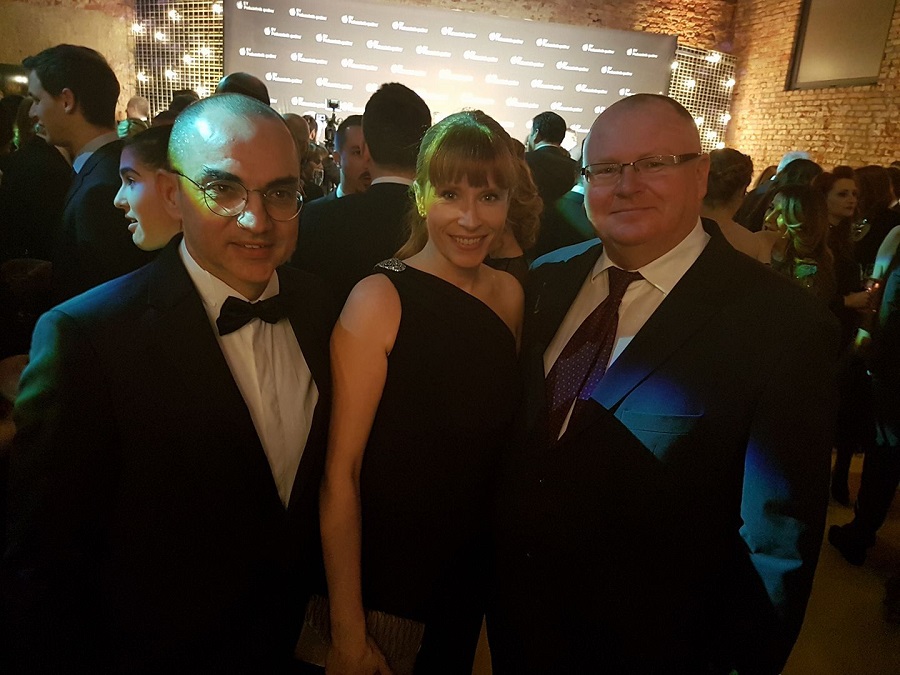
(Varteks Unlimited - TCN at last year's event with Nenad and Rujana Bakic)
Last year's winner will be a hard act to follow - the one and only Mate Rimac, whose Rimac Automobili is setting the standards in electric vehicle technology. You can see Rimac's acceptance speech below and read more about last year's event in this TCN report.
This year's edition will take place once more at Lauba in Zagreb, a guaranteed night of positivity and hope for Hrvatska. This year's finalists have not yet been announced, but with such a rich vein of Croatian entrepreneurial spirit currently flowing, there will no doubt be a very worthy winner. TCN will be there to bring you a full report.
Investment Issues: Croats Do Not Want to Work, Complain All the Time
The InvestCro conference on investment issues in Croatia was held in Zagreb, attended by representatives of large companies, governments and local administration units, reports Večernji List on March 21, 2019.
“We expect big investments, but really important are those investors who hire two or three people. Bjelovar had investments worth 100 million euro last year, mostly from small businesses. We want to send a message to investors that their kuna is worth more in our town than elsewhere. We do not invest money in buying voters, but in development, we now have 750 more employees in the town than before, and the budget revenues are growing,” said Dario Hrebak, the mayor of Bjelovar.
"Bjelovar quickly reached the top ten towns by investments. Construction permits are issued within 15 days. We want to achieve standardisation, so investors are no longer dependent on the goodwill of municipal employees. The only chance is to digitise all the processes in the state administration system, which demands the political will. While the government is dealing with rescuing Uljanik, we have to stop projects because we do not have enough money. By the way, Bjelovar is the first town in Croatia by the number of cafes. We have to create the ideal of work since about 40 per cent of Croats do not want to work at all,” said Hrebak.
Zdenko Lucić, state secretary at the Ministry of the Economy, said that Croatia should be branded as a desirable destination for investments, just as it has managed to become branded as a tourist country. “We have over 500 self-government units. Digitisation will help us have a standardised service level. Quick results will be visible with the introduction of an online establishment of businesses. We are sometimes shy to say that our investment promotion law is the best in Europe," Lucić said.
Viktor Pavlinić, the CEO of Tele2, said digitalisation was an opportunity, but a change in the pattern of behaviour was needed. He pointed out that the government in 2014 tripled the charges for telecom operators. “That was no longer a stimulating investment environment. This government has resolved this problem and returned the levies to the previous levels, which are still higher than in other countries. Now, Tele2 is employing 40 per cent more people, and the market competition is better. Encouraged by this optimism, the owner has decided to double the amount of investment. Achieving economic growth of five per cent is possible. Although we have a good staff in the ICT sector, the labour costs have become a serious problem. There is a need to revise the tax rate, to lower income tax if we want our workers to stay here,” said Pavlinć.
Regional Director of Dogus Holding, Burak Baykan, said that the experiences of the hotel company in Zadar and Šibenik are positive and must be transferred to new investors as well. “I would not say bureaucracy here is worse than in other countries. We have a hard time finding the right employees, we do not have enough people for greenfield investments, and construction costs have grown tremendously, as in Western countries, but with lower revenues here. The return on investment is meagre, we need to think about direct incentives,” said Baykan.
Zdenko Adrović, director of the Croatian Bank Association, complained about high fees for bankers, whose regulatory cost is three times higher than in Germany, and there is a problem with parafiscal charges as well, with the Ministry of Tourism attempting to increase the amount of tourist board fees.
Mladen Fogec, president of the Association of Foreign Investors in Croatia, said that foreigners are worried because Croats just complain. “We are too burdened with negativity, although there are many good examples. Why are investments in Međimurje or Istria possible but not in the south? Local units should act in favour of investors, both Croatian and foreign. Our capacity to change is currently not strong enough. Croatia has a great chance, but we need political courage," Fogec said.
Translated from Večernji List (reported by Ana Blašković).
More news about investment in Croatia can be found here.
Small D3Stooges3D Printing Studio Becomes Profitable Business
They left their former jobs, took out all the savings and started their business. This is the beginning of the story about D3Stooges3D, a small printing studio hidden on the ground floor of one of the buildings in Novi Zagreb, where four friends print everything customers ask them, from animal figures and characters from movies and video games to cups, pods, soap holders, earrings. And they are doing great, reports Večernji List on February 13, 2019.
“It started four years ago when our father put together a 3D printer because he wanted to work on aeroplanes models,” said the brothers Daniel and Luke Kirin, remembering how they first got interested in the technology. They were joined by their friends, also brothers Ivan and Filip Ormuž. They bought drawing tablets for one hundred euros and started to improvise. They downloaded models from the internet and printed them as a test, but soon they started making their own.
“We printed everything we could think of. Sometimes we would succeed, sometimes not. For example, a longboard shaft we designed for ourselves got completely stuck to the table,” explained Luka.
After some time, they received an offer for a larger project, 400 casings for TV sets. They went into the "unknown", as they say, but the job turned out well, and they earned good money. And so, they decided to devote themselves to business more seriously. “We said ‘let's try it,’ took out all our savings and started the company,” Daniel described.
Now they have five printers, four with the FDM technology and one with the DLP technology, each costing between 1,000 and 2,000 euros. The design process begins with receiving the order, and besides the printing, the guys also design and process the finished items. They work with the resin as well, and they started improvising with ceramics. They are currently creating a 40-part Volkswagen van replica that will serve as a gramophone records shelf.
“We are never bored since clients order different things. The price of a product ranges from 50 kuna for simpler pendants, up to tens of thousands of kuna for more demanding projects. The most expensive one was the decoration for a shop window near Makarska. It took us a month to do it,” they said.
They have also had several international projects, and they plan over time to expand to the overseas market. “The 3D printing is still relatively unknown and underdeveloped, but people abroad recognise its potential much more. For the time being, in Croatia it is mostly used in medicine, for example, for artificial hips, while creative printing like we do is almost non-existent,” said Ivan.
All four believe they had not made a mistake when they decided to launch D3Stooges3D. “We are doing what we love; this is a creative job, and it is always interesting, and if one can live from it than it is a perfect combination,” the team from Zapruđe concluded.
Translated from Večernji List (reported by Jelena Pišonić Babić).
More news on Croatian entrepreneurs can be found in the Made in Croatia section.
Migrant Entrepreneurship Neglected in Croatia
ZAGREB, February 5, 2019 - Migrant entrepreneurship has great potential, but in Croatia that is a marginal topic and there are several obstacles preventing it from developing, above all administrative and financial obstacles, it was said at a panel discussion on Tuesday.
Mirela Alpeza, the director of the Centre for Development Policy for SMEs (CEPOR) believes that the issue of migrant entrepreneurship is inadequately represented in the public and political spheres, adding that there is a lot of potential in migrant entrepreneurship which isn't being utilised in Croatia.
For example, there are 37 million people living in the EU who were not born there, which makes up for 7% of the total population. In Great Britain, one in seven companies is a migrant company and they employ 14% of the population in that country. In the past 20 years, the number of migrant companies in the USA has increased from 13% to 28%.
The head of the Asylum, Integration and Human Safety Programme at the Centre for Peace Studies, Sara Kekuš, warned of a lack of statistical data on migrant entrepreneurship in Croatia.
She underscored the lack of a strategy and a public policy for the social and economic integration of migrants, adding that the current action plan focuses only on refugees and not migrants.
Kekuš added that the biggest problem facing migrant entrepreneurship is red tape, above all trying to obtain a Personal Identification Number (OIB) or taxation number required to launch or register a business.
In addition, foreigners from third countries are required to deposit at least 100,000 kuna in founding capital to start a public company or as much as 200,000 kuna to start a private company, which for most migrants is impossible.
More news on the migrant issues in Croatia can be found in the Politics section.
Meet Belma Gutlić, RioBot CEO and G2.4 Startup Winner in Zagreb
November 17, 2018 - Continuing our look at the exciting world of Croatian IT startups, meet Belma Gutlić, CEO of RioBot which earlier this week won an award for the best startup at the G2.4 diaspora conference in Zagreb.
One of the things I have appreciated most about moving from Hvar to Varazdin is my proximity to Zagreb. Don't get me wrong, Hvar is a wonderful place to live but not the most practical choice of base if most of your face to face business is in Zagreb. Moving closer to Zagreb has opened up a new and very stimulating world to me - the young, motivated and extremely talented next generation of Croatian IT entrepreneur.
The more I delve into the layers of Croatia's capital city, the more I have hope for the future of this country. The Croatian IT sector has a huge future here, and a growing number of very smart young Croats who want to live in their own country and not follow the depressing road of emigration taken by so many. They have a huge part to play in Croatia's future, and although a large part of their technology is already too advanced for this British Neanderthal, it is a pleasure to mix with and learn from them, as well as giving them a little help with some international exposure.

One of the many things I liked about this week's G2.4 diaspora conference in Zagreb was the chance for young Croatian startups to pitch their ideas and investment offers to the wealthy international diaspora gathering. Ten of the best Croatian startups were given 5 minutes each to present their idea and request for funding, with the winner getting 15,000 kuna of consultancy from Ernst and Young. Meet the winner - Belma Gutlić, CEO of RioBot.
- Congratulations on being named the best startup at the recent G2.4 conference in Zagreb. Introduce Rio Bot to us, and tell us what makes it special.
RioBot is a personal assistant on Facebook Messenger for small businesses that takes care of appointments 24/7 through Messenger while being super easy to set up for anyone with just a Facebook page.
It’s great because it uses already existing platform that majority of people are already apart (let’s be honest, almost everyone has Facebook) so they don’t need to install any new application or register new account somewhere. We plan to expand to other platforms like Viber too. On the other side, service owners like dentists and hair or beauty salons don’t need any IT knowledge to make their chatbot and have online booking.
Also, my team members Marin Petrunić and Željko Dragosavac are making it special!
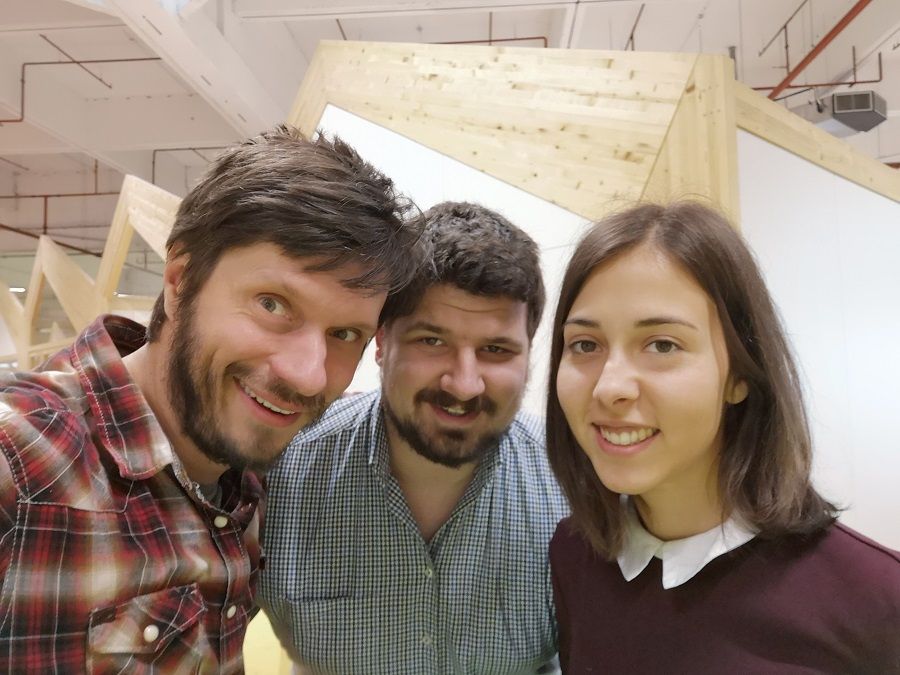
- When did the project start, and what phase are you at now?
It took us around 8 months for development because we are still bootstrapping and doing this in our “free time”. We are going to production now and as of this week, we have one client who is already using it so we are super excited about it! More are incoming, of course.
- Take us through the user experience, both from someone making the reservation, and the business managing those reservations.
If you want to make a reservation you can just contact your desired place over Facebook messages or directly in Messenger to the page. You can type which service you want and when do you want to come but we offer buttons in chat that Facebook is strongly suggesting to use as people are more likely to click than type. Chatbot is answering instantly at any time of the day or night, however, we try to make it as humanly as possible so people don’t feel uncomfortable :) Feel free to test the demo at Rio Salon Ljepote page (it’s in Croatian).
Businesses have their separate admin application from which they can manage incoming appointments, their services, employees, locations and turn RioBot on/off. It is important to point out that admin is a standalone application, custom tailored for the needs of business owners and employees. Core of admin application is an easy-to-use calendar of appointments from which owners can track, cancel or add new ones. We have plans to add new cool features like chatting with customers directly from the admin panel, notifying them about any unexpected changes etc.
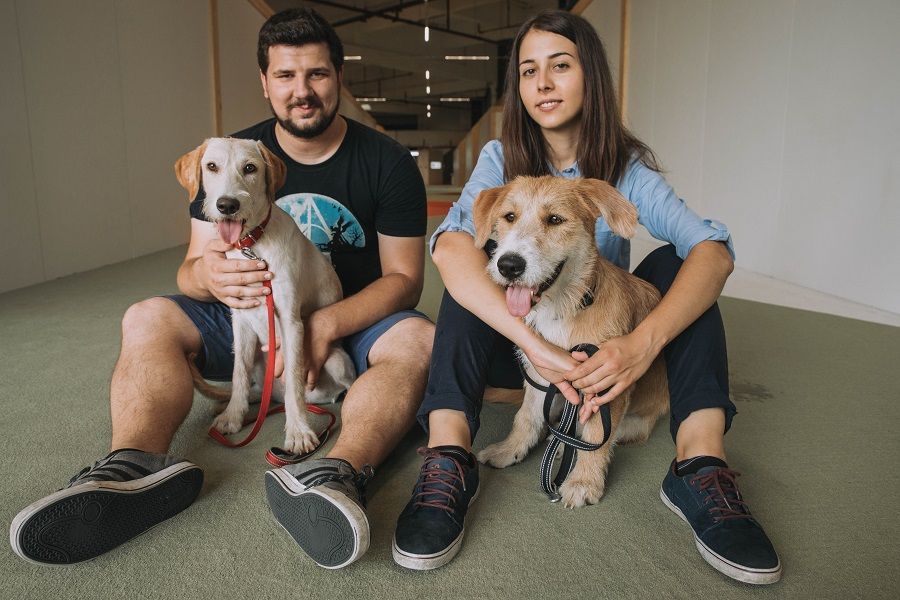
- Money! What are your cash projections from Rio Bot, for a city like Zagreb, for example?
We did some calculations and estimated that if we take 8% of beauty salon and dentists only in Zagreb that we’d be making 10k Euro monthly. I may say that’s modest because the market and possibilities are much bigger than that.
- What kind of investment are you looking for? Where will it be used, and what will the investor get in return?
We are looking for a smaller seed investment, up to 30k Euro for 10% of equity in RioBot. It would be used to polish current features and add new ones, with payment integration being the most important. We’d also integrate some new features that we received by feedback from our customers that were part of the testing phase. From then we can take it global.

- Rio Bot is only part of what you do at Node Factory. Tell us more about your core business and other projects you are involved in.
NodeFactory is a blockchain development agency that Marin and I have co-founded this year. It’s a pretty new technology so everyday has something interesting, it’s one of the reasons why we love it! Our business developer and third team member is Željko and he’s running his own web development business (Husky Bytes).
- Although Zagreb does not have any of the big IT companies with offices there, the Croatian IT and startup industry is having considerable success. Tell us a little about that, and the Croatian IT startup in general.
There are some really successful companies around here but things could be even better. There’s a lot of people and project with potential so it is sad to see them often leaving because of economic and political reasons. I’ve been following the startup scene here for some time now since this is not my first startup and I can see that things are improving. We now have many more startup competitions, networking (both local and global), possibilities of financing and startup incubators like Zagreb Innovation Centre (ZICER) that we are part of.
- Where will Belma Gutlic be in 5 years?
That’s a tough one. Hopefully developing new technologies and leveraging them to make better applications worldwide and our lives easier. Where? Around the world, I guess. Software really doesn’t have limits.
To learn more about RioBot, visit the official website.
To learn more about innovation coming out of Croatia, follow TCN's dedicated Made in Croatia section.
Below some screenshots from the RioBot system.
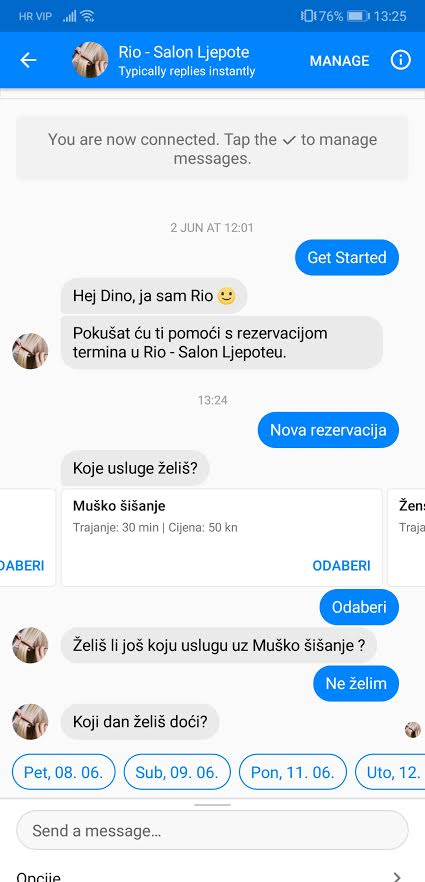
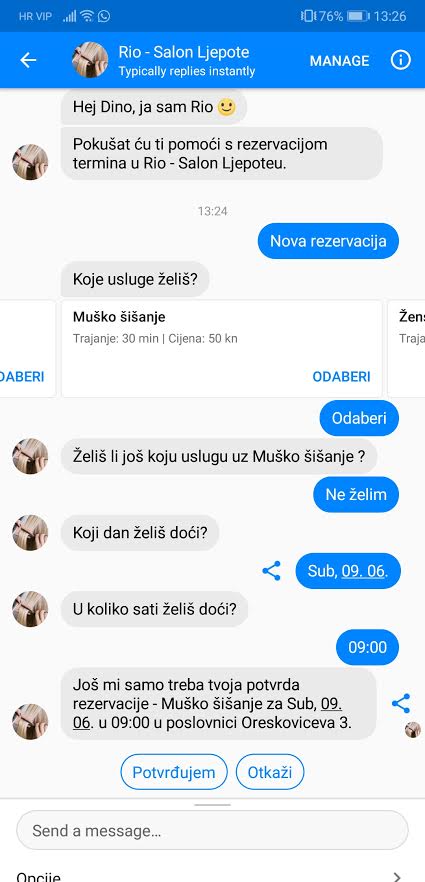
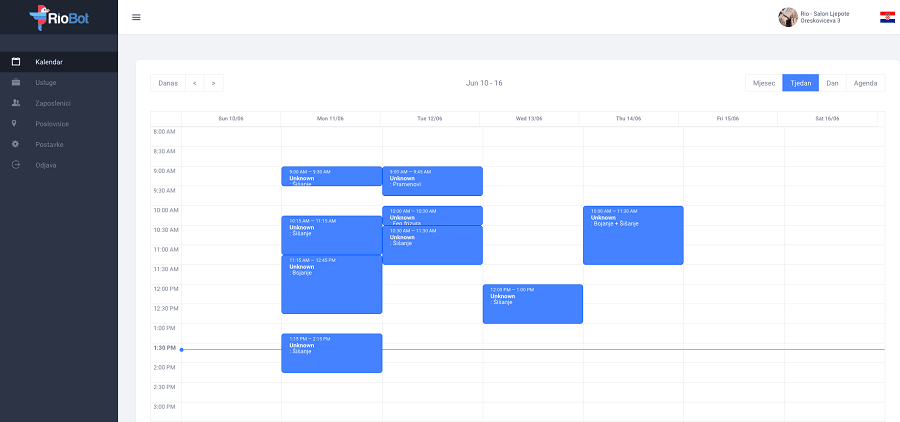



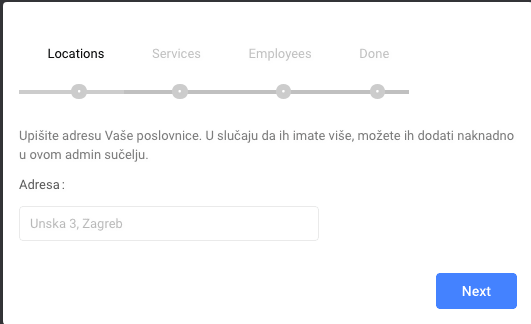
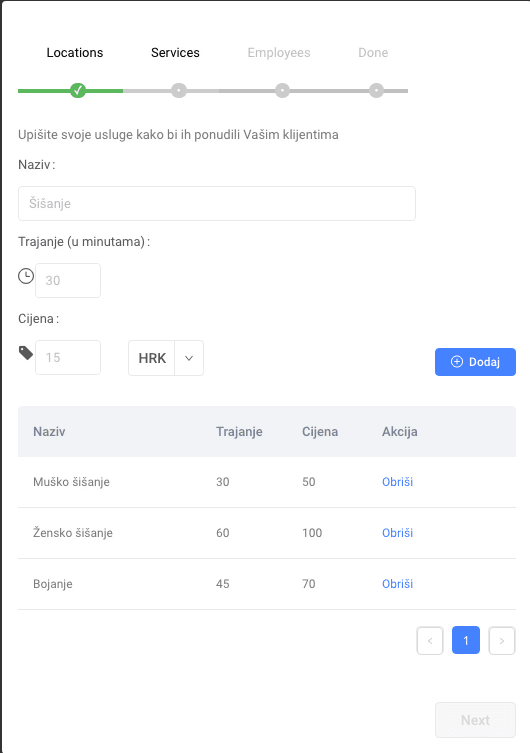
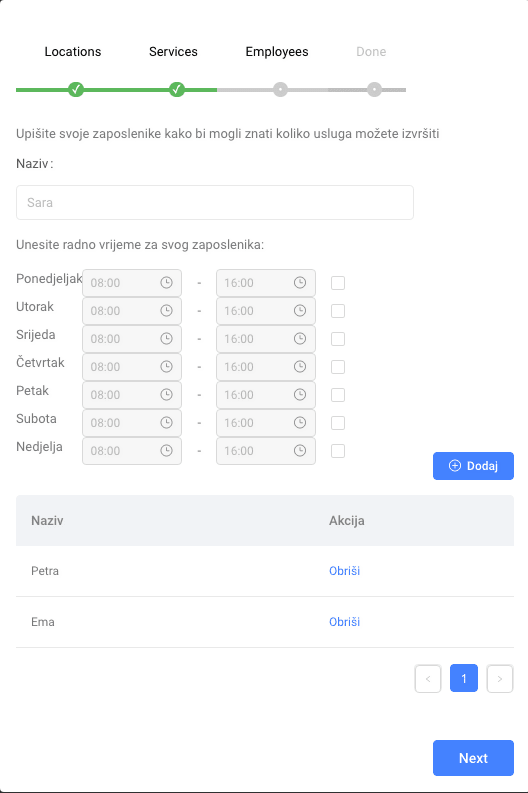
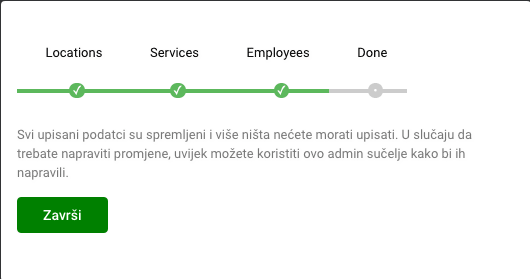
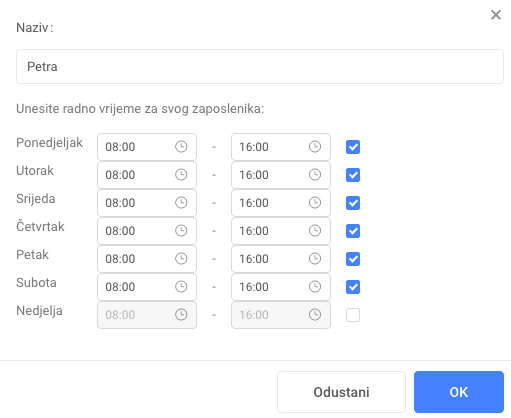
Croatian Company Introduces Four-Day Workweek
The move is expected to bring about greater employee satisfaction.
100 New Jobs Are Either Going To Croatia or Poland
June 5, 2018 - A hundred new IT jobs for Croatia or Poland, which to choose for this Split-based company?
When Will Croatia Begin to Recognise and Support Its Entrepreneurs?
May 31, 2018 - With its economy in dire trouble, Croatia continues to hinder, rather than help, one sector that could put things back on track - its entrepreneurs.
Best Women Entrepreneurs in Croatia Awarded
ZAGREB, May 23, 2018 - Celebrating International Women Entrepreneurs’ Day, the Croatian Association of Business Women – KRUG on Wednesday presented awards to the most successful women entrepreneurs in Croatia in 2018 in three categories.


